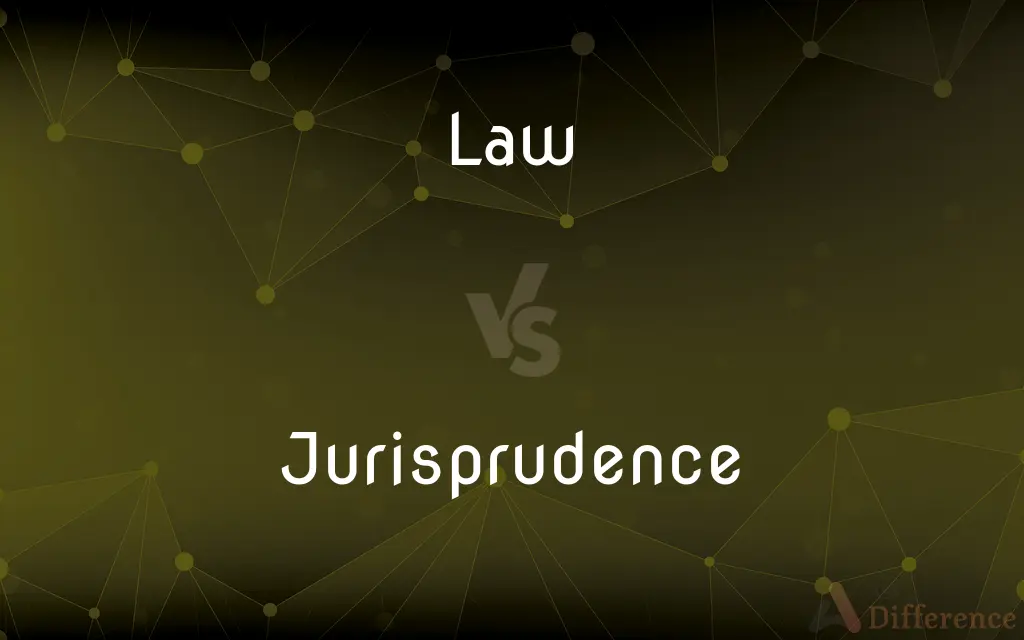Law vs. Jurisprudence — What's the Difference?
By Tayyaba Rehman — Updated on November 2, 2023
Law is a system of rules enforced through social or governmental institutions; jurisprudence is the theory or philosophy of law.

Difference Between Law and Jurisprudence
Table of Contents
ADVERTISEMENT
Key Differences
Law refers to a system of rules created and enforced through social or governmental institutions to regulate behavior. Jurisprudence is the theoretical study of those laws, encompassing the philosophy behind legal systems.
Law provides a framework within which individuals, organizations, and governments operate. Jurisprudence critically examines how laws are made, interpreted, and applied, exploring their impact on society.
Law is implemented through legislation, judicial decisions, and administrative regulations. Jurisprudence analyzes these aspects and considers their coherence, efficacy, and moral underpinnings.
Law is concrete, with specific statutes and regulations that govern behavior. Jurisprudence delves into abstract notions, such as justice, rights, and legal reasoning, influencing legal thinking and practices.
Law is practiced by legal professionals who apply it in various contexts. Jurisprudence is the realm of scholars and philosophers who reflect on the deeper implications and functioning of the law.
ADVERTISEMENT
Comparison Chart
Definition
Set of enforceable rules.
Study or theory of law.
Nature
Concrete, practical.
Abstract, theoretical.
Purpose
To govern behavior and maintain order.
To understand and explain legal concepts.
Practitioners
Lawyers, judges, legislators.
Legal theorists, philosophers.
Impact
Directly affects society.
Influences legal thought and reforms.
Compare with Definitions
Law
A rule enacted or customary in a community and recognized as commanding or forbidding certain actions.
The new law required everyone to wear a helmet while riding a bicycle.
Jurisprudence
The science or philosophy of law.
His interest in jurisprudence stemmed from a desire to understand the legal principles shaping society.
Law
The whole system or set of rules made by the government of a town, state, country, etc.
She practiced family law in the state of New York.
Jurisprudence
A system or body of law.
The jurisprudence of the Supreme Court affects all lower courts in the U.S.
Law
A principle based on the predictable consequences of an act, condition, etc.
The law of supply and demand dictates market prices.
Jurisprudence
Knowledge or expertise in law.
Her jurisprudence was respected by her peers, making her a leading figure in legal scholarship.
Law
The control brought about by the existence or enforcement of such law.
Law and order were maintained by the new police presence in the neighborhood.
Jurisprudence
The course of court decisions as distinct from legislation and doctrine.
American jurisprudence has evolved significantly over the past century.
Law
Law is a system of rules created and enforced through social or governmental institutions to regulate behavior, with its precise definition a matter of longstanding debate. It has been variously described as a science and the art of justice.
Jurisprudence
A division, type, or particular body of law.
He specialized in civil jurisprudence, focusing on non-criminal disputes.
Law
A rule of conduct or procedure established by custom, agreement, or authority.
Jurisprudence
Jurisprudence, or legal theory, is the theoretical study of law. Scholars of jurisprudence seek to explain the nature of law in its most general form and provide a deeper understanding of legal reasoning and analogy, legal systems, legal institutions, and the role of law in society.Modern jurisprudence began in the 18th century and was focused on the first principles of natural law, civil law, and the law of nations.
Law
The body of rules and principles governing the affairs of a community and enforced by a political authority; a legal system
International law.
Jurisprudence
The philosophy or science of law.
Law
The condition of social order and justice created by adherence to such a system
A breakdown of law and civilized behavior.
Jurisprudence
A division, type, or particular body of law
Modern jurisprudence.
Federal jurisprudence.
Bankruptcy jurisprudence.
Law
A set of rules or principles dealing with a specific area of a legal system
Tax law.
Criminal law.
Jurisprudence
(legal) The theoretical study of law.
Law
A statute, ordinance, or other rule enacted by a legislature.
Jurisprudence
(legal) Case law, or the body of case law regarding a certain subject.
Law
A judicially established legal requirement; a precedent.
Jurisprudence
The science of juridical law; the knowledge of the laws, customs, and rights of men in a state or community, necessary for the due administration of justice.
The talents of Abelard were not confined to theology, jurisprudence, philosophy.
Law
The system of judicial administration giving effect to the laws of a community
All citizens are equal before the law.
Jurisprudence
The branch of philosophy concerned with the law and the principles that lead courts to make the decisions they do
Law
Legal action or proceedings; litigation
Submit a dispute to law.
Jurisprudence
The collection of rules imposed by authority;
Civilization presupposes respect for the law
The great problem for jurisprudence to allow freedom while enforcing order
Law
An impromptu or extralegal system of justice substituted for established judicial procedure
Frontier law.
Law
An agency or agent responsible for enforcing the law. Often used with the
"The law ... stormed out of the woods as the vessel was being relieved of her cargo" (Sid Moody).
Law
(Informal) A police officer. Often used with the.
Law
The science and study of law; jurisprudence.
Law
Knowledge of law.
Law
The profession of an attorney.
Law
Something, such as an order or a dictum, having absolute or unquestioned authority
The commander's word was law.
Law
A body of principles or precepts held to express the divine will, especially as revealed in the Bible.
Law
The first five books of the Hebrew Scriptures.
Law
A code of principles based on morality, conscience, or nature.
Law
A rule or custom generally established in a particular domain
The unwritten laws of good sportsmanship.
Law
A way of life
The law of the jungle.
Law
A statement describing a relationship observed to be invariable between or among phenomena for all cases in which the specified conditions are met
The law of gravity.
Law
A generalization based on consistent experience or results
The law of supply and demand.
Law
(Mathematics) A general principle or rule that is assumed or that has been proven to hold between expressions.
Law
A principle of organization, procedure, or technique
The laws of grammar.
The laws of visual perspective.
Law
(usually with "the") The body of binding rules and regulations, customs, and standards established in a community by its legislative and judicial authorities.
The courts interpret the law but should not make it.
In theory, entrapment is against the law.
Law
The body of such rules that pertain to a particular topic.
Property law
Commercial hunting and fishing law
Law
Common law, as contrasted with equity.
Law
A binding regulation or custom established in a community in this way.
There is a law against importing wallabies.
A new law forbids driving on that road.
The court ruled that the executive order was not law and nullified it.
Law
(more generally) A rule, such as:
Law
Any rule that must or should be obeyed, concerning behaviours and their consequences. mores.}}
"Do unto others as you wish them to do unto you" is a good law to follow.
The law of self-preservation
Law
A rule or principle regarding the construction of language or art.
The laws of playwriting and poetry
Law
A statement (in physics, etc) of an (observed, established) order or sequence or relationship of phenomena which is invariable under certain conditions. theory.}}
The laws of thermodynamics
Newton's third law of motion states that to every action there is always an equal and opposite reaction.
This is one of several laws derived from his general theory expounded in the Philosophiæ Naturalis Principia Mathematica.
Law
A statement (of relation) that is true under specified conditions; a mathematical or logical rule.
Mathematical laws can be proved purely through mathematics, without scientific experimentation.
Law
Any statement of the relation of acts and conditions to their consequences.
The law of scarcity
The law of supply and demand
Law
(linguistics) A sound law; a regular change in the pronunciation of a language.
Grimm's law
Dahl's law
Law
(cricket) One of the official rules of cricket as codified by the its (former) governing body, the MCC.
Law
The control and order brought about by the observance of such rules.
They worked to maintain law and order.
It was a territory without law, marked by violence.
Law
(informal) A person or group that act(s) with authority to uphold such rules and order (for example, one or more police officers).
Here comes the law — run!
Then the law arrived on the scene
Law
The profession that deals with such rules (as lawyers, judges, police officers, etc).
He is studying for a career in law.
She has practiced law in New York for twenty years.
Law
Jurisprudence, the field of knowledge which encompasses these rules.
She went to university to study law.
Law
Litigation; legal action (as a means of maintaining or restoring order, redressing wrongs, etc).
They were quick to go to law.
Law
An allowance of distance or time (a head start) given to a weaker (human or animal) competitor in a race, to make the race more fair.
Law
(aviation) A mode of operation of the flight controls of a fly-by-wire aircraft.
Normal law; alternate law; direct law
Law
(fantasy) One of two metaphysical forces ruling the world in some fantasy settings, also called order, and opposed to chaos.
Law
An oath sworn before a court, especially disclaiming a debt. wager of law", "wage one's law", "perform one's law", "lose one's law".}}
Law
(obsolete) A tumulus of stones.
Law
A hill.
Law
A score; share of expense; legal charge.
Law
(obsolete) To work as a lawyer; to practice law.
Law
To prosecute or sue (someone), to litigate.
Law
(nonstandard) To rule over (with a certain effect) by law; to govern.
Law
(informal) To enforce the law.
Law
To subject to legal restrictions.
Law
(dated) An exclamation of mild surprise; lawks.
Law
In general, a rule of being or of conduct, established by an authority able to enforce its will; a controlling regulation; the mode or order according to which an agent or a power acts.
These are the statutes and judgments and laws, which the Lord made.
The law of thy God, and the law of the King.
As if they would confine the Interminable . . . Who made our laws to bind us, not himself.
His mind his kingdom, and his will his law.
Law
In morals: The will of God as the rule for the disposition and conduct of all responsible beings toward him and toward each other; a rule of living, conformable to righteousness; the rule of action as obligatory on the conscience or moral nature.
Law
The Jewish or Mosaic code, and that part of Scripture where it is written, in distinction from the gospel; hence, also, the Old Testament.
What things soever the law saith, it saith to them who are under the law . . . But now the righteousness of God without the law is manifested, being witnessed by the law and the prophets.
Law
An organic rule, as a constitution or charter, establishing and defining the conditions of the existence of a state or other organized community.
Law
In philosophy and physics: A rule of being, operation, or change, so certain and constant that it is conceived of as imposed by the will of God or by some controlling authority; as, the law of gravitation; the laws of motion; the law heredity; the laws of thought; the laws of cause and effect; law of self-preservation.
Law
In mathematics: The rule according to which anything, as the change of value of a variable, or the value of the terms of a series, proceeds; mode or order of sequence.
Law
In arts, works, games, etc.: The rules of construction, or of procedure, conforming to the conditions of success; a principle, maxim; or usage; as, the laws of poetry, of architecture, of courtesy, or of whist.
Law
Collectively, the whole body of rules relating to one subject, or emanating from one source; - including usually the writings pertaining to them, and judicial proceedings under them; as, divine law; English law; Roman law; the law of real property; insurance law.
Law
Legal science; jurisprudence; the principles of equity; applied justice.
Reason is the life of the law; nay, the common law itself is nothing else but reason.
Law is beneficence acting by rule.
And sovereign Law, that state's collected willO'er thrones and globes elate,Sits empress, crowning good, repressing ill.
Law
Trial by the laws of the land; judicial remedy; litigation; as, to go law.
When every case in law is right.
He found law dear and left it cheap.
Law
An oath, as in the presence of a court.
Law
An exclamation of mild surprise.
Law
Legal document setting forth rules governing a particular kind of activity;
There is a law against kidnapping
Law
The collection of rules imposed by authority;
Civilization presupposes respect for the law
The great problem for jurisprudence to allow freedom while enforcing order
Law
A generalization that describes recurring facts or events in nature;
The laws of thermodynamics
Law
A rule or body of rules of conduct inherent in human nature and essential to or binding upon human society
Law
The learned profession that is mastered by graduate study in a law school and that is responsible for the judicial system;
He studied law at Yale
Law
The force of policemen and officers;
The law came looking for him
Law
The branch of philosophy concerned with the law and the principles that lead courts to make the decisions they do
Law
The legal profession.
He decided to enter law after graduating from college.
Common Curiosities
Who studies jurisprudence?
Jurisprudence is studied by legal scholars, philosophers, and students of law.
What is the definition of law?
Law is a set of rules established by a governing authority to regulate conduct.
How is jurisprudence different from law?
Jurisprudence is the study and theory of law, focusing on its nature, sources, and principles.
Is law always based on statutes?
Law can be based on statutes, regulations, or judicial decisions.
Can jurisprudence influence the creation of law?
Yes, jurisprudential theories can shape the development and interpretation of laws.
Who practices law?
Law is practiced by legal professionals such as lawyers, judges, and legislators.
What are the types of law?
Types of law include civil, criminal, administrative, and constitutional law.
What role does jurisprudence play in society?
Jurisprudence provides a deeper understanding and critique of legal systems, guiding legal thought and reform.
Is jurisprudence considered a legal degree?
Jurisprudence can be an area of study within legal education, but it is not a professional degree like a Juris Doctor (JD).
Are there different schools of jurisprudence?
Yes, there are multiple schools, such as natural law, positivism, and legal realism.
What role do laws play in society?
Laws establish standards, maintain order, resolve disputes, and protect liberties and rights.
Can jurisprudence predict legal outcomes?
Jurisprudence is more concerned with legal theory than predicting outcomes, which is more the role of applied legal knowledge.
What is common law?
Common law is a body of unwritten laws based on legal precedents established by the courts.
How does jurisprudence view common law?
Jurisprudence studies common law to understand its principles, evolution, and impact on the legal system.
Is knowledge of jurisprudence necessary for practicing law?
While not strictly necessary, knowledge of jurisprudence can give legal practitioners a deeper perspective on legal issues and decision-making.
Share Your Discovery

Previous Comparison
Study vs. Research
Next Comparison
Coveralls vs. OverallsAuthor Spotlight
Written by
Tayyaba RehmanTayyaba Rehman is a distinguished writer, currently serving as a primary contributor to askdifference.com. As a researcher in semantics and etymology, Tayyaba's passion for the complexity of languages and their distinctions has found a perfect home on the platform. Tayyaba delves into the intricacies of language, distinguishing between commonly confused words and phrases, thereby providing clarity for readers worldwide.













































